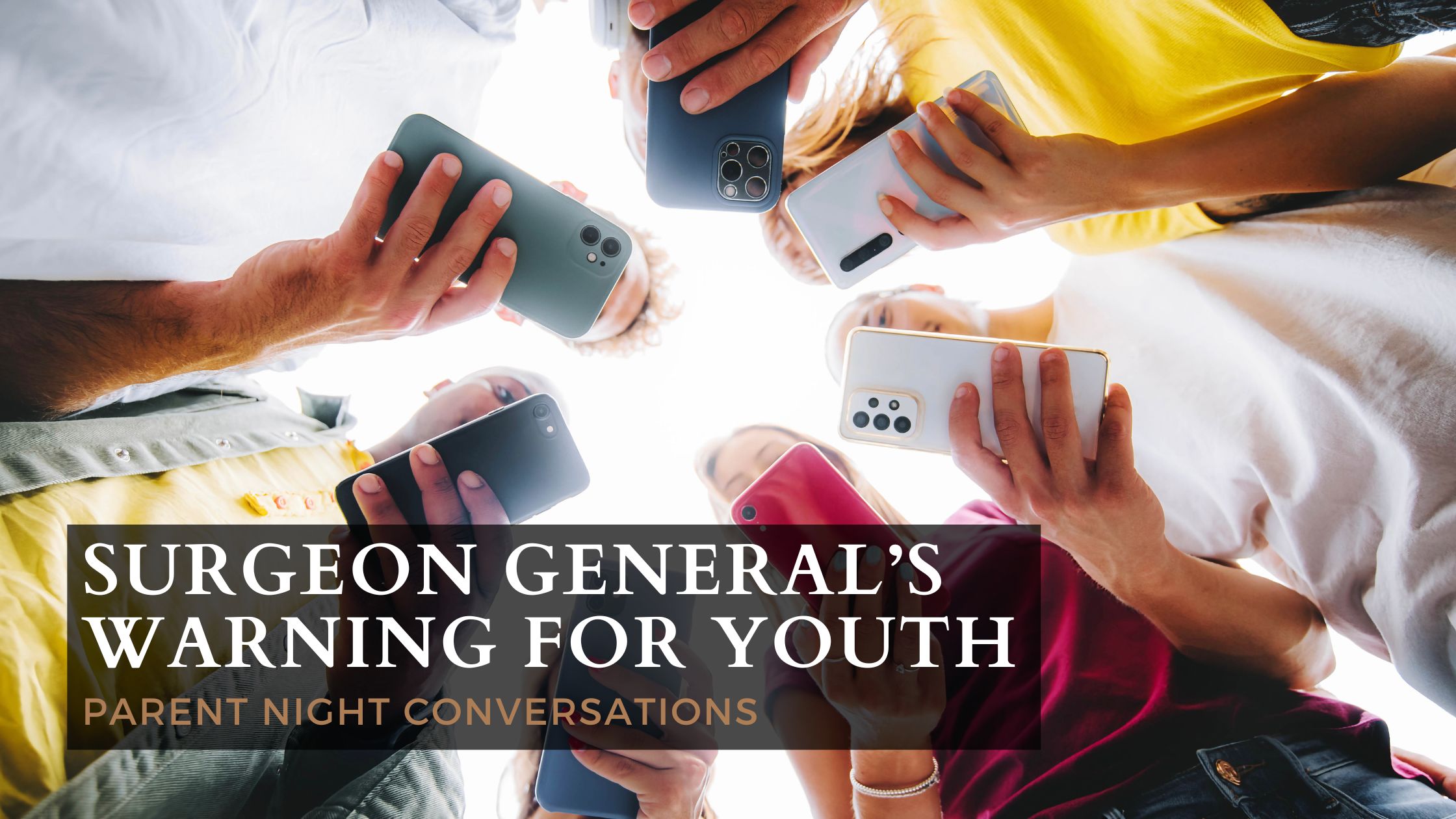Another youth minister I know did an anonymous survey with their youth group, asking them what the most pressing things they wanted to learn about were. Their overwhelming response… mental health. Youth today know that they are facing a mental health crisis, and even want our help in dealing with it. That’s why when this report came out with the Surgeon General’s Warning on Social Media and Youth Mental Health a few months ago, I took notice.
Highlights from the Surgeon General’s Warning on Social Media and Youth Mental Health
Here are a few highlights…
Up to 95% of young people aged 13-17 report using a social media platform. Nearly two thirds of teenagers report using social media every day and one third report using social media “almost constantly.”
This is out there everywhere. It’s going to be nearly impossible to avoid it completely. The problem is with the dangers it poses to their still-developing brains.
The types of use and content children and adolescents are exposed to pose mental health concerns. Children and adolescents who spend more than 3 hours a day on social media face double the risk of mental health problems including experiencing symptoms of depression and anxiety. This is concerning as a recent survey showed that teenagers spend an average of 3.5 hours a day on social media.
Ultimately, limiting screen time helps to reduce the risks. The problems come when they are overly exposed to unrealistic comparisons, and normalization of self-harm and other dangerous behaviors.
And when asked about the impact of social media on their body image, 46% of adolescents aged 13-17 said social media makes them feel worse.
What Parents Can Do
The report even highlights some things that parents can do to help alleviate the impact of social media on our youth. And by social media, we’re not just talking about Facebook, Instagram and Twitter, but it includes other platforms like Tik-Tok, Snapchat, YouTube, Pinterest, and more. Basically, anywhere the content is user-generated is considered “social media.”
Here are some of the Surgeon General recommendations:
1. Create a family media plan to help establish healthy technology boundaries at home—including social media use. For information on creating a family media plan, visit www.healthychildren.org/English/fmp/Pages/MediaPlan.aspx .
2. Create tech-free zones and encourage children and adolescents to foster in-person friendships.
3. Model responsible social media behavior.
4. Teach children and adolescents about technology and empower them to be responsible online participants at the appropriate age.
5. Work with other parents to help establish shared norms and practices and to support programs and policies around healthy social media use.
What Children and Youth Can Do
We should be educating our kids and helping them make responsible decisions too. Considering that, the Surgeon General also has some recommendations for youth too:
1. Reach out for help. If you or someone you know is being negatively affected by social media, reach out to a trusted friend or adult for help. If you or someone you know is experiencing a mental health crisis, call or text 988 for immediate help.
2. Create boundaries to help balance online and offline activities.
3. Develop protective strategies and healthy practices for your own social media use. See this Tip Sheet on Social Media Use and Mental Health for healthy social media use created for and by young people.
4. Be selective with what you post and share online and with whom, as it is often public and can be stored permanently.
5. Protect yourself and others from cyberbullying or other forms of online harassment and abuse:
- If you or someone you know is the victim of cyberbullying or other forms of online harassment and abuse, don’t keep it a secret.
- Protect others by not taking part in online harassment or abuse. Avoid forwarding or sharing messages or images, tell others to stop, and report offensive content.
I believe that if we teach them well, and help them learn how to make good, responsible decisions, then that’s a big step in this battle!
Summarizing Some Key Points From Our Conversation
I likely won’t have it all captured here, but I’ll do my best! But as we talked, we all seemed to have some great ideas that we could all use to help us better parent through all of this. Here are some that come to mind…
- Consider a family plan/contract with your kids to lay out expectations so that everyone is on the same page.
- Leverage all of the parental controls you can. Services like Bark (my referral link) can be helpful in filtering and monitoring activity.
- As parents, we need to be familiar with the technology ourselves so that we can speak to it directly.
- Connect our conversations back to goals that they have so they can make the connection with their actions and how it impacts their lives.
- Find device-free times… meals, car rides, etc. Basically, make sure there are opportunities when devices get put away, and then take advantage of the chance to actually have conversations.
- Prioritize face-to-face interactions. That is ultimately the key to everything! Even during a device-allowed time, don’t let the screens get between those face-to-face conversations. It shows them that they are more important than the screen in your hand.
I’d also suggest that we pray for them. Our youth are dealing with and processing a lot these days, more than I remember having to deal with when I was a kid. And while there are definitely some pluses to the connectivity and technology we have today, it can also contribute to the overload of stimuli that they have to manage. So pray that the Lord would give them the wisdom to make good decisions, the strength to handle it all, and the grace to help them heal when impacted by what they are processing.
And in youth group, I’ll keep modeling the good and doing what I can to support healthy digital habits. But let me know if there is anything I can do specifically to help you and your family.
Thanks, everyone, for another fantastic Parent’s Night!




